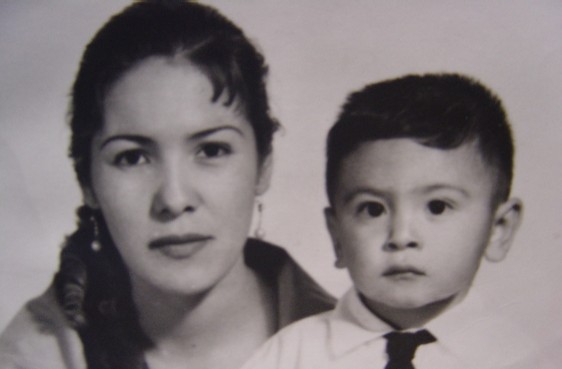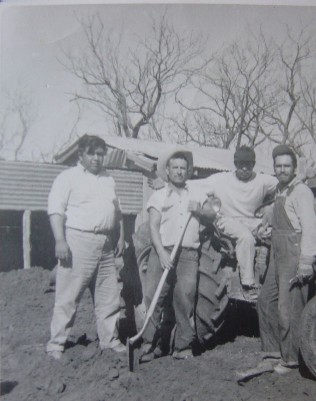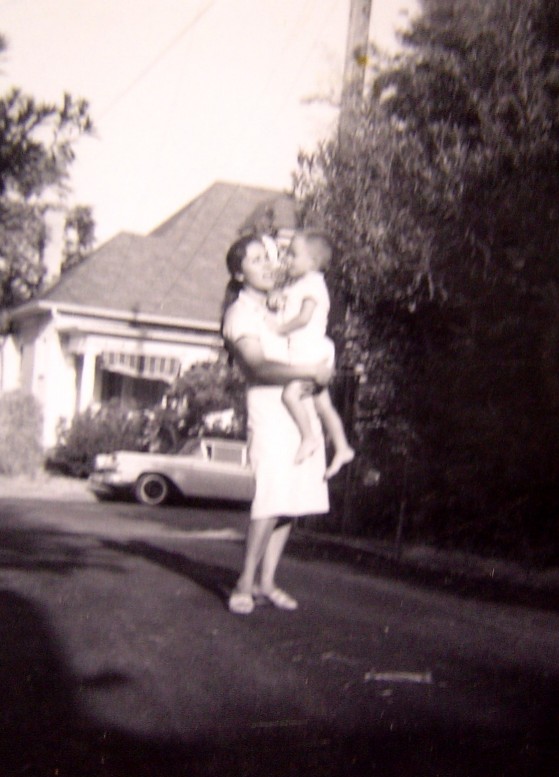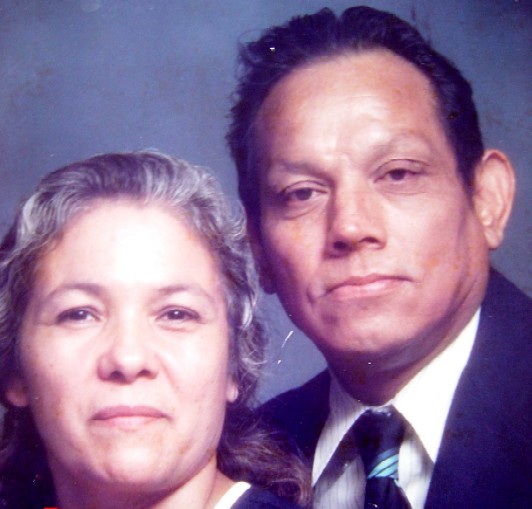|
|
My mother Juanita Esquivel Leija was born to Santos Esquivel DeLeon and Mauricia Carrera de Esquivel on May 6, 1940 in
Piedras Negras, Coahila Mexico.
She was one of eight children in her home, 5 sisters and 3 brothers she being the second to the oldest. She attended school at Francisco and Madero but had to leave school in the 5th grade to help in the home with her younger siblings. At the age of 20 she became pregnant and in search for a new start she decided to take the biggest step of her life. In 1964 She migrated to San Antonio in hopes to improve her life and that of her son. A year later she met my father Robert Leija and married on December 29, 1966. This began her journey to establish her life here in America.

What do you remember most growing up in Piedras Negras?
One of the memories of living in Piedras Negras was the time when the
great flood of Piedras Negras
How long did it take before you could return home after the flood?
I remember My father's boss sent an airplane to come pick us up and we lived in his farm for a month. After that month we returned to find our home destroyed, everything was gone, all we had was each other.
How did you live until you reconstructed?
My father built us a home made of four wood pillars and our roof was made of Palm leafs. We lived out in the open and the only shade we had was under the palm leaves. We made food out in the open where we used a tub and mesquite wood to cook. Fortunately in our land we had a well that we would take water out daily to bath and cook.
What memory do you have of your father and mother as child?
I have beautiful memories of my parents, because they loved each other even through hardship and separation due to work. My father would come to work here in San Antonio as a farmer and would leave the house sometimes a month sometimes even a year.

What was your parents' reaction when they found out of your pregnancy?
It was a hard thing to except for my mother; she got so upset with me and even got to the point of running me out. I pleaded with her to have mercy on me and she continued in her anger. My father came from San Antonio and talked to my mother, he was so forgiving and understanding. His words were "It's done and now all we can do is help her."
What was your response to their reactions?
I cried so much because I knew I had ruined the "Esquivel" reputation. However, I felt determined to raise my child as best as I could.
When and how did you decide to come to San Antonio?
I decided to come to San Antonio after my son was about a year and eight months. He was the main reason for my immigration and I knew this was a great way to make a difference in my son's life.
How do you feel about the decision you made in migrating to San Antonio?
I was scared because I didn't know what to expect or how things would turn out for me in San Antonio. Looking back at my decision, I am extremely happy I migrated to San Antonio. My Son is now successful here in America, he is married to a wonderful German wife and has blessed me with four beautiful grandkids.
How and with whom did you get here?
My older brother had already begun working here in San Antonio and he was the one that opened the doors to come here. My two younger sisters also came alone with us and we were able to rent a home.
Once you got here where did you go and what did you do?
My brother acquainted us with a wonderful women named Mrs. Trujillo who opened her home for a small fee. I remember the first thing we did was to unpack and gave thanks to God for keeping us safe.
What were your fears as a new immigrant?
I was scared because I didn't know anyone here in San Antonio. Another fear I had was that
immigration (INS) would find us and take us back to Mexico.
What were your hopes?
My hope was to find a job so I could send my mother money for my son's education and in time bring him over to live with me.
Describe your first job and salary.
My first job was working as a housekeeper in
Henry B. Gonzales's home in downtown San Antonio(the Monte Vista District),
where my pay was $12.00 dollars a week. However because of some circumstances I left their home to go to another household were they paid me the same for much more work. Finally I moved to the Emerson residence where I got paid $25.00 dollars a week and room and board.

Tell me about the photograph where you're dressed up in a prom dress.
That's a funny story. One weekend the family left on a trip. I stayed behind with another worker. She said lets get put on fancy clothes and pretend that we own this big house. So we did, and then took pictures. Those aren't my clothes and necklace. I'm glad we didn't get caught!
What were your recreational activities in San Antonio?
My favorite recreational activity was going to the movies at the
"Alameda" in downtown San Antonio.
How did you meet my father?
I met Robert Leija when he came to deliver liquor to the Emerson household. I answered the door and we both made eye contact and our relationship began from there.
How did he propose and where did you marry?
He came to the Emerson house and asked me to marry him, however I told him he had to ask my father. I recall he went all the way to Mexico, when my father was there, to ask for my hand. We then got married through the court.
What were your dreams and goals after being married?
To one day have a home of my own and to bring my son over from Mexico.
What accomplishments are you most proud of?
I am proud that I have been able to make a good home for my children and all my children have grown up to be happy and successful.
What are your desires for your children?
That they may prosper in their carreers and live a good life.
What advice would you give them?
My advice to them would be to continue their dreams and goals. Never to give up even when hard times and change come to their lives.
If you could change something about your life what would you change?
One thing I which I could get back, that has slipped somewhat away, is the laughter and sweet spirit I had when I was young. I know it's still inside of me, yet trials and disappointment that have inflicted my life has in some way made a callous in my heart.
Is there anything you would like to add?
I would like to encourage you, my daughter, to follow your dreams the way I did. I remember when you were younger your dreams were to one day become a teacher. Know you are taking those steps to complete your desires and I just want to let you know, your father and I are very proud of you. One last thing, I want to thank God for everything he has seen me through.
Piedras Negras, Coahuila. http://www.piedrasnegras.gob.mx/.
This site gives you a short brief history of Piedras Negras and everything you would need to know if someday you wish to visit this boarder town in Mexico.
Comuni-K
Nuestra Historia (Our History). http://www.piedrasnegras.gob.mx/galeria3.html.
The site gives a few pictures of Piedras Negras's history; which include specific pictures taken of the great flood of Piedras Negras.
U.S.A Immigration Services http://www.usais.org/index.htm#/ (2001).
This is a very informative site where you can learn who is eligible and how to apply for citizenship. You will learn about the Green card Lottery (application for permanent residency), Visas and Citizenship.
Jarvits, Janet.
"Cook Book" Betty Crocker Edition History http://www.cookbkjj.com/college/betty_crocker.htm#top.
This site gives you an insight of the origins of Betty Crocker. From how they got their name to the different editions of the Betty Crocker picture cookbooks from 1930 to 1996
Alameda. The Alameda National Center for Latin Arts and Culture. http://www.thealameda.org/theater.htm (2003).
The Alameda is a non-profit organization that bring to San Antonio Latino Arts and Culture through arts, education, economic developments and entertainment.

One of the most eye opening experiences I learned from doing this project was to hear what great sacrifices and hardships my mother had to undergo to give me and my offspring a different and prosperous life. I never really understood how hard it was for my mother being unwed and Mexican to bear a child during the 1960's. I am able to appreciate all my mother's sacrifices to bring me a brighter future. I know have the privilege to live in a democratic nation that gives me and my children many opportunities. The benefits of the interview process is that we get to learn firsthand account of history filled with feelings and emotions which give you a different outlook of what history really is. One offset of the interview process is you sometimes find out disturbing, yet truthful insights that have never been discussed. I believe this oral history project is a great way of learning new and different outlooks on history. It gives you what the text books leave out, and honestly it makes it much more interesting and fun to learn.